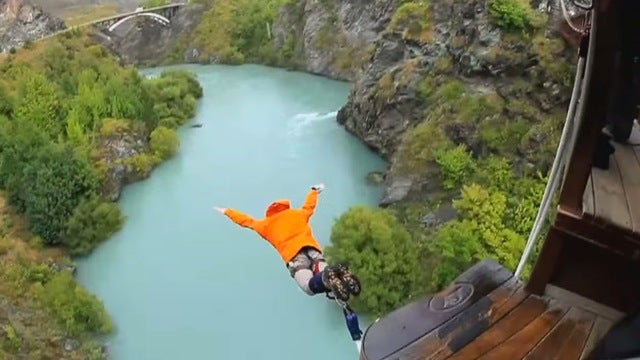Richard Alley on trains, human-powered transportation, and community leadership

Richard Alley bungee jumps in an episode of the PBS miniseries, “Earth: The Operators' Manual on PBS.”
“Five Questions with…” is a regular Keystone Crossroads feature where we seek to glean wisdom and ideas from some of Pennsylvania’s top urban thinkers and doers. Richard Alley is a professor at Penn State University. He was part of the United Nations Intergovernmental Panel on Climate Change, which was recognized with a Nobel Prize in 2007.
Q: Tell us about an amenity or service that you’ve seen in your travels to other places that you wish you could bring back to your city/community?
A: My dear wife Cindy and I were in Cambridge, England this summer, where I was giving a talk and meeting with scientists. We took the train up from London and back. The price was low and the service was prompt and efficient, reminiscent of many experiences available in some parts of the U.S., but not convenient for the rest of us. That ability to jump on a train and go somewhere, without needing to drive your own car, is really nice, and opens the possibility of more people living without the expense of a car.
Q: What’s one urban improvement idea that you could categorize as “nice try but didn’t work”?
A: For the foreseeable future, a lot of people are going to rely on cars to get into, out of, and around cities. But simply building another road often doesn’t help. It takes a lot of often-thankless efforts to develop integrated solutions to move people more efficiently and to give them the option of not moving so much, but such efforts often pay off.
Q: Describe a person in your community who is a “spark” — someone who seems to get things done and inspire people. (This does not need to be an elected official.)
A: One of the big reasons our community is such a good place to live is that there are so many “sparks” making things better, including Cindy. Among these, I have often had the opportunity to talk with the participants at Leadership Centre County, with Executive Director Georgia Abbey and many volunteers who work to develop leadership within and who are dedicated to the community. Successfully coupling leadership to community helps everyone.
Q: What flaw or habit does your city/community have that you would like to see change?
A: Our community is great, so any complaining should be weighed against the good being done here. I bicycle and jog to work, and progress is being made in making human-powered commuting better. And our town is eighth highest in the nation in use of mass transit per capita. But I still occasionally meet someone who votes or governs from the idea that transportation means cars, and who views human-powered and public transportation as problems rather than as the solutions that they can be.
Q: Tell us about a movie or book that depicts, in a way that grabbed your attention, how a city can thrive or fail.
I recently had the opportunity to help make a PBS miniseries, Earth: The Operators’ Manual, with Geoff Haines-Stiles and Erna Akuginow of Passport to Knowledge, focused on energy and the environment. They filmed some fantastic stories, in places including Fort Worth and small-town Kansas, Baltimore, Portland, and Alaska, of people saving energy and saving money, doing well by doing good. The options are rich and varied, and can be customized to help any city.
Editor’s note: We originally identified Richard Alley as a Nobel Prize winner because of his involvement with the United Nations Intergovernmental Panel on Climate Change, which was recognized with a Nobel Prize in 2007. Alley did not win the prize as an individual. As per Alley’s request, we’ve edited the article to make that distinction.
Is there someone you know who thinks hard about cities and knows how to get things done? Someone whom Keystone Crossroads should spend “Five Questions with …” Please let us know in the comment sections below or via Facebook or Twitter @Pacrossroads.
WHYY is your source for fact-based, in-depth journalism and information. As a nonprofit organization, we rely on financial support from readers like you. Please give today.


